- Home
- G. K. Chesterton
Murder On Christmas Eve Page 8
Murder On Christmas Eve Read online
Page 8
She swiftly put three packs of blancmange on the shelf with their fellows and moved away. A few minutes later she returned and studied several cake mixes as she waited for the aisle to clear. Then she completed her mission and finished her shopping in a leisurely fashion.
At the checkout she chatted brightly to the bored teenager who rang up her purchases automatically. Then she left, gently humming the song that flowed from the shop’s speakers.
Three days later, Maggie Staniforth burst into her living-room in the middle of the afternoon to find Sarah typing a job application. ‘Red alert, love,’ she announced. ‘I’m only home to have a quick bath and change my things. Any chance of a sandwich?’
‘I was beginning to wonder if you still lived here,’ Sarah muttered darkly. ‘If you were having an affair, at least I’d know how to fight back.’
‘Not now, love, please.’
‘Do you want something hot? Soup? Omelette?’
‘Soup, please. And a toasted cheese sandwich?’
‘Coming up. What’s the panic this time?’
Maggie’s eyes clouded. ‘Our homicidal maniac has struck again. Eight people on the critical list at the General. This time the arsenic was in Garratt’s Blancmange from Pinkerton’s Hypermarket. Bill’s doing a television appeal right now asking for people to bring in any packets bought there this week.’
‘Different manufacturer, different supermarket. Sounds like a crazy rather than a grudge, doesn’t it?’
‘And that makes the next strike impossible to predict. Anyway, I’m going for that bath now. I’ll be down again in fifteen minutes.’ Maggie stopped in the kitchen doorway, ‘I’m not being funny, Sarah. Don’t do any shopping in the supermarkets. Butchers, greengrocers, okay. But no self-service, pre-packaged food. Please.’
Sarah nodded. She had never seen Maggie afraid in eight years in the force, and the sight did nothing to lift her depressed spirits.
This time it was jars of mincemeat. Even the Salvation Army band playing carols outside the Nationwide Stores failed to make the woman pause in her mission. Her shopping bag held six jars laced with deadly white powder when she entered the supermarket.
When she left, there were none. She dropped 50p in the collecting tin as she passed the band because they were playing her favourite carol, ‘In the Bleak Midwinter’. She walked slowly back to the car park, not pausing to look at the shop-window Christmas displays. She wasn’t anticipating a merry Christmas.
Sarah walked back from the newsagent’s with the evening paper, reading the front page as she went. The Burnalder Poisoner was front-page news everywhere by now, but the stories in the local paper seemed to carry an extra edge of fear. They were thorough in their coverage, tracing any possible commercial connection between the three giant food companies that produced the contaminated food. They also speculated on the possible reasons for the week-long gaps between outbreaks. They laid out in stark detail the drastic effect the poisoning was having on the finances of the food-processing companies. And they noted the paradox of public hysteria about the poisoning while people still filled their shopping trolleys in anticipation of the festive season.
The latest killer was Univex mincemeat. Sarah shivered as she read of the latest three deaths, bringing the toll to twelve. As she turned the corner, she saw Maggie’s car in the drive and increased her pace. A grim idea had taken root in her brain as she read the long report.
While she was hanging up her jacket, Maggie called from the kitchen. Sarah walked slowly through to find her tucking into a plate of eggs and bacon, but without her usual large dollop of tomato ketchup. There were dark circles beneath her eyes and the skin around them was grey and stretched. She had not slept at home for two nights. The job had never made such demands on her before. Sarah found a moment to wonder if the atmosphere between them was partly responsible for Maggie’s total commitment to this desperate search.
‘How is it going?’ she asked anxiously.
‘It’s not,’ said Maggie. ‘Virtually nothing to go on. No link that we can find. It’s not as if we even have proper leads to chase up. I came home for a break because we were just sitting staring at each other, wondering what to do next. Short of searching everyone who goes into the supermarkets, what can we do? And those bloody reporters seem to have taken up residence in the station. We’re being leaned on from all sides. We’ve got to crack this soon or we’ll be crucified.’
Sarah sat down. ‘I’ve been giving this some thought. The grudge theory has broken down because you can’t find a link between the companies, am I right?’
‘Yes.’
‘Have you thought about the effect unemployment has on crime?’
‘Burglary, shoplifting, mugging, vandalism, drugs, yes. But surely not mass poisoning, love.’
‘There’s so much bitterness there, Maggie. So much hatred. I’ve often felt like murdering those incompetent tossers who destroyed Liddell’s and threw me on the scrap-heap. Did you think about people who’ve been given the boot?’
‘We did think about it. But only a handful of people have worked for all three companies. None of them have any reason to hold a grudge. And none of them have any connection with Burnalder.’
‘There’s another aspect, though, Maggie. It only hit me when I read the paper tonight. The News has a big piece about the parent companies who make the three products. Now, I’d swear that each one of those companies has advertised in the last couple of months for management executives. I know, I applied for two of the jobs. I didn’t even get interviewed because I’ve got no experience in the food industry, only in plastics. There must be other people in the same boat, maybe less stable than I am.’
‘My God!’ Maggie breathed. She pushed her plate away. The colour had returned to her cheeks and she seemed to have found fresh energy. She got up and hugged Sarah fiercely. ‘You’ve given us the first positive lead in this whole bloody case. You’re a genius!’
‘I hope you’ll remember that when they give you your inspector’s job.’
Maggie grinned on her way out the door. ‘I owe you one. I’ll see you later.’
As the front door slammed, Sarah said ironically, ‘I hope it’s not too late already, babe.’
Detective Inspector Bill Nicholson had worked with Maggie Staniforth for two years. His initial distrust of her gender had been broken down by her sheer grasp of the job. Now he was wont to describe her as ‘a bloody good copper in spite of being a woman’, as if this were a discovery uniquely his, and a direct product of working for him. As she unfolded Sarah’s suggestion, backed by photostats of newspaper advertisements culled from the local paper’s files, he realised for the first time she was probably going to leapfrog him on the career ladder before too long. He didn’t like the idea, but he wasn’t prepared to let that stand between him and a job of work.
They started on the long haul of speaking directly to the personnel officers of the three companies. It meant quartering the country and they knew they were working against the clock. Back in Burnalder, a team of detectives was phoning companies who had advertised similar vacancies, asking for lists of applicants. The lumbering machinery of the law was in gear.
On the evening of the second day, an exhausted Maggie arrived home. Six hundred and thirty-seven miles of driving had taken their toll and she looked crumpled and older by ten years. Sarah helped her out of her coat and poured her a stiff drink in silence.
‘You were right,’ Maggie sighed. ‘We’ve got the name and address of a man who has been rejected by all three firms after the first interview. We’re moving in on him tonight. If he sticks to his pattern, he’ll be aiming to strike again tomorrow. So with luck, it’ll be a red-handed job.’ She sounded grim and distant. ‘What a bloody waste. Twelve lives because he can’t get a bloody job.’
‘I can understand it,’ Sarah said abruptly and went through to the kitchen.
Maggie stared after her, shocked but comprehending. She felt again the low rumble of anger i
nside her against a system that set her to catch the people it had so often made its victims. If only Sarah had not lost her well-paid job, then Maggie knew she would have left the force by now, but they needed her salary to keep their heads above water. The job itself was dirty enough; but the added pain of keeping her relationship with Sarah constantly under wraps was gradually becoming more than she could comfortably bear. Sarah wasn’t the only one whose choices had been drastically pruned by her unemployment.
By nine fifty-five a dozen detectives were stationed around a neat detached house in a quiet suburban street. In the garden a ‘For Sale’ sign sprouted among the rose bushes. Lights burned in the kitchen and living-room.
In the car, Bill made a final check of the search warrant. Then, after a last word over the radio, he and Maggie walked up the short drive.
‘It’s up to you now,’ he said and rang the doorbell. It was answered by a tall, bluff man in his mid-forties. There were lines of strain round his eyes and his clothes hung loosely, as if he had recently lost weight.
‘Yes?’ he asked in a pleasant, gentle voice.
‘Mr Derek Millfield?’ Maggie demanded.
‘That’s me. How can I help you?’
‘We’re police officers, Mr Millfield. We’d like to have a word with you, if you don’t mind.’
He looked puzzled. ‘By all means. But I don’t see what…’ His voice tailed off. ‘You’d better come in, I suppose.’
They entered the house and Millfield showed them into a surprisingly large living-room. It was tastefully and expensively furnished. A woman sat watching television.
‘My wife Shula,’ he explained. ‘Shula, these are policemen – I mean officers. Sorry, miss.’
Shula Millfield stood up and faced them. ‘You’ve come for me, then,’ she said.
It was hard to say who looked most surprised. Then suddenly she was laughing, crying and screaming, all at once.
Maggie stretched out on the sofa. ‘It was appalling. She must have been living on a knife-edge for weeks before she finally flipped. He’s been out of work for seven months. They’ve had to take their kids out of private school, had to sell a car, sell their possessions. He had no idea what she was up to. I’ve never seen anyone go berserk like that. All for the sake of a nice middle-class lifestyle.
‘There’s no doubt about her guilt, either. Her fingerprints are all over the jar of arsenic. She stole the jar a month ago. She worked part-time in the pharmacy at the cottage hospital in Kingcaple. But they didn’t notice the loss. God knows how. Deputy-heads will roll,’ she added bitterly.
‘What will happen to her?’ Sarah asked coolly.
‘She’ll be tried, if she’s fit to plead. But I doubt if she will be. I’m afraid it’ll be the locked ward for life.’ When she looked up, Maggie saw there were tears on Sarah’s cheeks. She immediately got up and put an arm round her. ‘Hey, don’t cry, love. Please.’
‘I can’t help it, Maggie. You see, I know how she feels. I know that utter lack of all hope. I know that hatred, that sense of frustration and futility. There’s nothing you can do to take that away. What you have to live with, Detective-Sergeant Staniforth, is that it could have been me.
‘It could so easily have been me.’
The Dagger with Wings
G. K. Chesterton
Father Brown, at one period of his life, found it difficult to hang his hat on a hat-peg without repressing a slight shudder. The origin of this idiosyncrasy was indeed a mere detail in much more complicated events; but it was perhaps the only detail that remained to him in his busy life to remind him of the whole business. Its remote origin was to be found in the facts which led Dr Boyne, the medical officer attached to the police force, to send for the priest on a particular frosty morning in December.
Dr Boyne was a big dark Irishman, one of those rather baffling Irishmen to be found all over the world, who will talk scientific scepticism, materialism and cynicism at length and at large, but who never dream of referring anything touching the ritual of religion to anything except the traditional religion of their native land. It would be hard to say whether their creed is a very superficial varnish or a very fundamental substratum; but most probably it is both, with a mass of materialism in between. Anyhow, when he thought that matters of that sort might be involved, he asked Father Brown to call, though he made no pretence of preference for that aspect of them.
‘I’m not sure I want you, you know,’ was his greeting. ‘I’m not sure about anything yet. I’m hanged if I can make out whether it’s a case for a doctor, or a policeman, or a priest.’
‘Well,’ said Father Brown with a smile, ‘as I suppose you’re both a policeman and a doctor, I seem to be rather in a minority.’
‘I admit you’re what politicians call an instructed minority,’ replied the doctor. ‘I mean, I know you’ve had to do a little in our line as well as your own. But it’s precious hard to say whether this business is in your line or ours, or merely in the line of the Commissioners in Lunacy. We’ve just had a message from a man living near here, in that white house on the hill, asking for protection against a murderous persecution. We’ve gone into the facts as far as we could, and perhaps I’d better tell you the story, as it is supposed to have happened, from the beginning.
‘It seems that a man named Aylmer, who was a wealthy landowner in the West Country, married rather late in life and had three sons, Philip, Stephen and Arnold. But in his bachelor days, when he thought he would have no heir, he had adopted a boy whom he thought very brilliant and promising, who went by the name of John Strake. His origin seems to be vague; they say he was a foundling; some say he was a gipsy. I think the last notion is mixed up with the fact that Aylmer in his old age dabbled in all sorts of dingy occultism, including palmistry and astrology, and his three sons say that Strake encouraged him in it. But they said a great many other things besides that. They said Strake was an amazing scoundrel, and especially an amazing liar; a genius in inventing lies on the spur of the moment, and telling them so as to deceive a detective. But that might very well be a natural prejudice, in the light of what happened. Perhaps you can more or less imagine what happened. The old man left practically everything to the adopted son; and when he died the three real sons disputed the will. They said their father had been frightened into surrender and, not to put too fine a point on it, into gibbering idiocy. They said Strake had the strangest and most cunning ways of getting at him, in spite of the nurses and the family, and terrorizing him on his deathbed. Anyhow, they seemed to have proved something about the dead man’s mental condition, for the courts set aside the will and the sons inherited. Strake is said to have broken out in the most dreadful fashion, and sworn he would kill all three of them, one after another, and that nothing could hide them from his vengeance. It is the third or last of the brothers, Arnold Aylmer, who is asking for police protection.’
‘Third and last,’ said the priest, looking at him gravely.
‘Yes,’ said Boyne. ‘The other two are dead.’
There was a silence before he continued. ‘That is where the doubt comes in. There is no proof they were murdered, but they might possibly have been. The eldest, who took up his position as squire, was supposed to have committed suicide in his garden. The second, who went into trade as a manufacturer, was knocked on the head by the machinery in his factory; he might very well have taken a false step and fallen. But if Strake did kill them, he is certainly very cunning in his way of getting to work and getting away. On the other hand, it’s more than likely that the whole thing is a mania of conspiracy founded on a coincidence. Look here, what I want is this. I want somebody of sense, who isn’t an official, to go up and have a talk to this Mr Arnold Aylmer, and form an impression of him. You know what a man with a delusion is like, and how a man looks when he is telling the truth. I want you to be the advance guard, before we take the matter up.’
‘It seems rather odd,’ said Father Brown, ‘that you haven’t had to take it up b
efore. If there is anything in this business, it seems to have been going on for a good time. Is there any particular reason why he should send for you just now, any more than any other time?’
‘That had occurred to me, as you may imagine,’ answered Dr Boyne. ‘He does give a reason, but I confess it is one of the things that make me wonder whether the whole thing isn’t only the whim of some half-witted crank. He declared that all his servants have suddenly gone on strike and left him, so that he is obliged to call on the police to look after his house. And on making inquiries, I certainly do find that there has been a general exodus of servants from that house on the hill; and of course the town is full of tales, very one-sided tales I dare say. Their account of it seems to be that their employer had become quite impossible in his fidgets and fears and exactions; that he wanted them to guard the house like sentries, or sit up like night nurses in a hospital; that they could never be left alone because he must never be left alone. So they all announced in a loud voice that he was a lunatic, and left. Of course that does not prove he is a lunatic; but it seems rather rum nowadays for a man to expect his valet or his parlourmaid to act as an armed guard.’
‘And so,’ said the priest with a smile, ‘he wants a policeman to act as his parlourmaid because his parlourmaid won’t act as a policeman.’
‘I thought that rather thick, too,’ agreed the doctor; but I can’t take the responsibility of a flat refusal till I’ve tried a compromise. You are the compromise.’
‘Very well,’ said Father Brown simply. ‘I’ll go and call on him now if you like.’
The rolling country round the little town was sealed and bound with frost, and the sky was as clear and cold as steel, except in the north-east where clouds with lurid haloes were beginning to climb up the sky. It was against these darker and more sinister colours that the house on the hill gleamed with a row of pale pillars, forming a short colonnade of the classical sort. A winding road led up to it across the curve of the down and plunged into a mass of dark bushes. Just before it reached the bushes the air seemed to grow colder and colder, as if he were approaching an ice-house or the North Pole. But he was a highly practical person, never entertaining such fancies except as fancies. And he merely cocked his eye at the great livid cloud crawling up over the house, and remarked cheerfully:

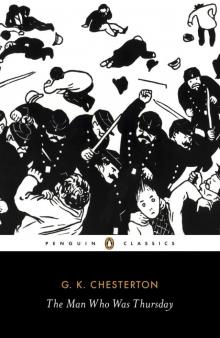 The Man Who Was Thursday: A Nightmare
The Man Who Was Thursday: A Nightmare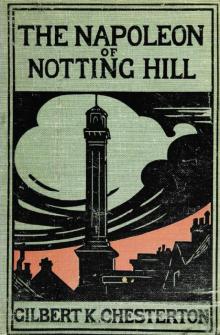 The Napoleon of Notting Hill
The Napoleon of Notting Hill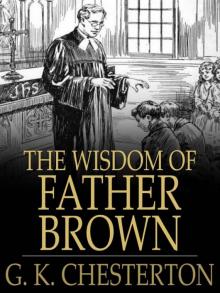 The Wisdom of Father Brown
The Wisdom of Father Brown G K Chesterton- The Dover Reader
G K Chesterton- The Dover Reader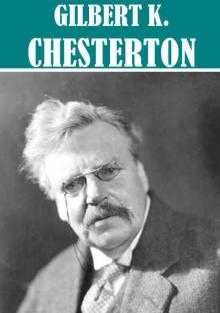 The Essential G. K. Chesterton
The Essential G. K. Chesterton The Trees of Pride
The Trees of Pride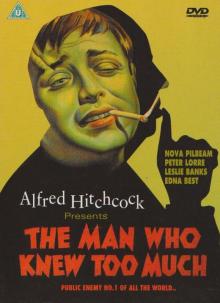 The Man Who Knew Too Much
The Man Who Knew Too Much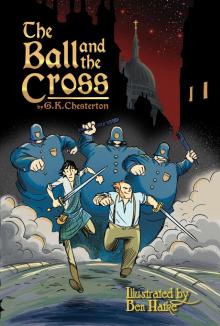 The Ball and the Cross
The Ball and the Cross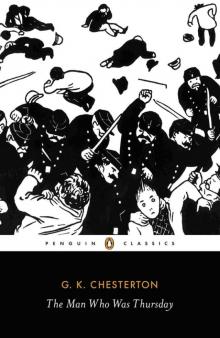 The Man Who Was Thursday (Penguin ed)
The Man Who Was Thursday (Penguin ed)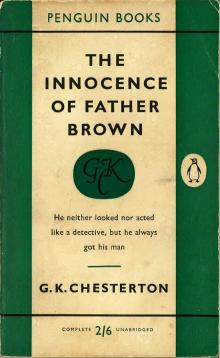 The Innocence of Father Brown
The Innocence of Father Brown The Victorian Age in Literature
The Victorian Age in Literature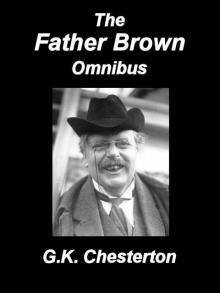 Father Brown Omnibus
Father Brown Omnibus Murder On Christmas Eve
Murder On Christmas Eve The Blue Cross
The Blue Cross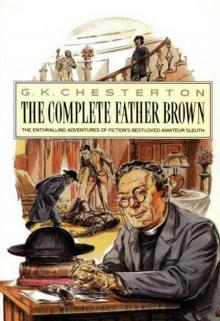 The Complete Father Brown Mysteries Collection
The Complete Father Brown Mysteries Collection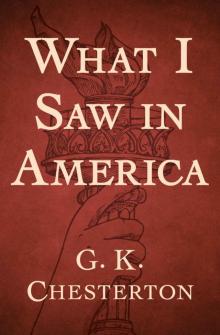 What I Saw in America
What I Saw in America